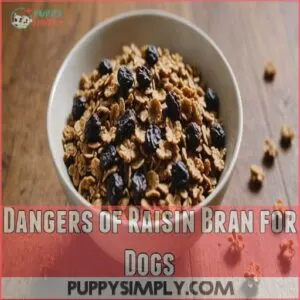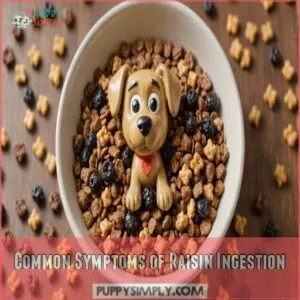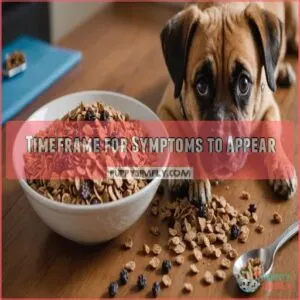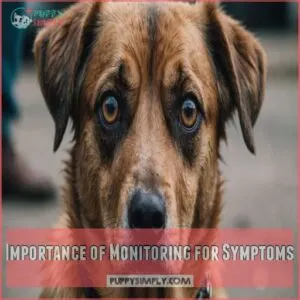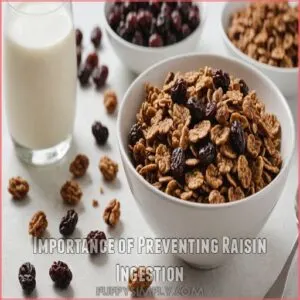This site is supported by our readers. We may earn a commission, at no cost to you, if you purchase through links.
 Can dogs eat raisin bran? The short answer is a resounding no. While your furry friend might give you those puppy eyes at breakfast, sharing your raisin bran is a big no-no.
Can dogs eat raisin bran? The short answer is a resounding no. While your furry friend might give you those puppy eyes at breakfast, sharing your raisin bran is a big no-no.
The bran part isn’t the villain here – it’s those tiny, innocent-looking raisins that spell trouble. Raisins are toxic to dogs and can cause serious health issues, including kidney failure. Even a small amount can be dangerous, and vets aren’t sure about a safe threshold.
It’s best to keep raisin bran and all raisin-containing foods out of paw’s reach. But don’t worry, there are plenty of dog-friendly breakfast options that’ll make your pup’s tail wag just as much.
Table Of Contents
- Key Takeaways
- Dangers of Raisin Bran for Dogs
- Why Are Raisins Bad for Dogs
- Can Dogs Eat Raisin Bran
- Symptoms of Raisin Toxicity in Dogs
- What to Do if Your Dog Eats Raisin Bran
- Safe Breakfast Cereal Options for Dogs
- Importance of Preventing Raisin Ingestion
- Treatment for Raisin Toxicity in Dogs
- Frequently Asked Questions (FAQs)
- Can dogs eat Raisin Bran?
- Can dogs eat raisin bread?
- Can a Dog Eat A Raisin puff?
- Are raisins bad for dogs?
- Can dogs eat bran cereal?
- Will my dog be okay if he ate one raisin?
- Will my dog be ok if he ate one grape?
- Are raisins ok for a dog?
- How many raisins in Raisin Bran are toxic?
- Can puppies get more sick from Raisin Bran?
- Does toasting or cooking raisins make them safer?
- Are some dog breeds more sensitive to raisins?
- How long does raisin poisoning treatment typically last?
- Conclusion
Key Takeaways
- Raisin bran is extremely toxic to dogs, as even a small amount of raisins can cause severe kidney damage or failure.
- If your dog eats raisin bran, contact your vet immediately—don’t wait for symptoms to appear, as quick action is crucial.
- Keep all raisin-containing foods out of your dog’s reach and educate family members about the dangers of raisins for dogs.
- You can offer safe cereal alternatives like plain oatmeal, Rice Krispies, or low-calorie training treats in moderation, as Cheerios are relatively low in sugar and fat, making them a relatively safe snack option for your dog.
Dangers of Raisin Bran for Dogs
You might think Raisin Bran is a harmless breakfast treat, but for your furry friend, it’s a dangerous snack.
The raisins in this cereal can cause severe kidney damage in dogs, making it essential to keep Raisin Bran out of your pet’s reach.
Raisin Toxicity Symptoms
After your dog eats raisins, watch out for these telltale signs of toxicity:
- Vomiting within 24 hours
- Diarrhea, often with abdominal pain
- Lethargy and weakness
- Decreased urine output
These symptoms can signal potential kidney failure, which is no laughing matter.
Even if your pup seems fine, don’t let your guard down.
Raisin toxicity can sneak up on you, so it’s vital to stay vigilant and act fast if you spot any red flags.
Risks of Feeding Raisin Bran
Feeding your dog Raisin Bran is like playing Russian roulette with their health.
The raisins in this cereal can trigger severe kidney failure, even in small amounts.
You might think, "It’s just a few raisins," but that’s all it takes to put your furry friend in danger.
Don’t gamble with your pup’s life – keep Raisin Bran off their menu and opt for safe, dog-friendly treats instead.
Importance of Immediate Veterinary Care
Time is of the essence when your dog consumes raisin bran.
Don’t wait for symptoms to appear; immediate veterinary care is essential.
Dogs can also be sensitive to various food allergens like novel protein sources, which may trigger allergic reactions.
Even a small amount of raisins can be toxic, potentially causing kidney failure.
Your quick action could be the difference between life and death for your furry friend.
Remember, it’s always better to be safe than sorry regarding your dog’s health.
Why Are Raisins Bad for Dogs
Lurking in your pantry, those innocent-looking raisins pose a serious threat to your furry friend.
Raisins, along with grapes, are highly toxic to dogs, potentially causing severe kidney damage or even failure.
While the exact cause remains a mystery, even small amounts can be harmful.
Here’s why raisins are a big no-no for your canine companion:
- They can cause rapid kidney failure
- The toxicity affects dogs of all breeds and sizes
- Even a single raisin can trigger symptoms
You might think, "But my dog’s eaten raisins before and was fine!"
Unfortunately, sensitivity varies, and previous luck doesn’t guarantee future safety.
It’s essential to keep all raisin-containing foods out of paw’s reach.
Remember, in terms of your dog’s health, it’s better to be safe than sorry.
Stick to dog-friendly treats and you’ll both sleep easier at night.
Can Dogs Eat Raisin Bran

You might be tempted to share your breakfast cereal with your furry friend, but regarding Raisin Bran, it’s a definite no-go for dogs.
Raisin Bran contains raisins, which are highly toxic to dogs and can cause severe health problems, including kidney failure.
Risks and Dangers of Raisin Bran
Raisin Bran poses serious risks for your furry friend.
While it might seem like a harmless breakfast treat, the raisins in this cereal can be deadly for dogs.
Let’s break down the dangers:
| Risk Factor | Severity | Action Required |
|---|---|---|
| Kidney Failure | High | Immediate Vet Care |
| Vomiting | Moderate | Monitor Closely |
| Diarrhea | Moderate | Hydrate & Watch |
| Lethargy | Moderate | Seek Vet Advice |
| Abdominal Pain | High | Urgent Vet Visit |
Remember, even a small amount can be harmful.
Keep Raisin Bran out of paw’s reach!
Safe Alternatives to Raisin Bran
Looking for safe alternatives to Raisin Bran for your furry friend, especially since some foods like those containing poppy seed toxicity can be hazardous to their health? You’re in luck!
There are plenty of dog-friendly options out there, and you can even find some specifically designed for dogs like this cereal.
Consider giving your pup some plain oatmeal, Rice Krispies, or Cheerios as occasional treats.
These cereals are much safer than raisin-containing ones.
When introducing new fruits like honeydew and cantaloupe, remember to keep portions small and always check with your vet before introducing new foods into your dog’s diet.
Your pooch’s health comes first!
Symptoms of Raisin Toxicity in Dogs
You need to know the signs of raisin toxicity in your dog if they’ve eaten Raisin Bran.
Watch for vomiting, diarrhea, lethargy, and abdominal pain within hours to days after ingestion.
Common Symptoms of Raisin Ingestion
You’ve got to watch out for these red flags if your pup’s snagged some raisins.
Keep an eye peeled for vomiting and diarrhea – they’re often the first signs something’s off.
Your furry friend might also lose their appetite, which is unusual for most dogs.
For ideas on safe alternatives, check out products related to Raisin Bran for Dogs.
If they’re acting lethargic or showing signs of abdominal pain, it’s time to sit up and take notice.
These symptoms are your cue to act fast.
Timeframe for Symptoms to Appear
Knowing the timeline of raisin toxicity in dogs is vital for swift action.
Symptoms can appear as quickly as 2-3 hours after ingestion or take up to 24-48 hours to manifest.
This wide window makes it tricky to pinpoint the exact moment your furry friend ate those pesky raisins.
Don’t let this fool you into a false sense of security – every minute counts when it comes to your pup’s health.
Importance of Monitoring for Symptoms
Watchful eyes can save lives when it comes to raisin toxicity in dogs.
Don’t wait for symptoms to worsen; swift action is essential.
Just like recognizing signs of dog limping back leg issues common causes of limping, early detection improves prognosis, and quick action prevents further damage.
Symptom severity can escalate rapidly.
Quick action prevents kidney damage.
Prompt vet visits increase survival rates.
Keep a close eye on your furry friend after potential raisin ingestion.
Your vigilance could be the difference between a close call and a tragedy.
Remember, with raisin toxicity, time is of the essence.
What to Do if Your Dog Eats Raisin Bran
If your dog eats Raisin Bran, act fast and call your vet immediately.
Quick action can make a big difference in your pet’s health, so don’t wait to see if symptoms appear.
Immediate Action Steps
Time is of the essence when your furry friend gobbles up Raisin Bran.
Don’t panic, but act fast, and consider whether they’ve a food allergy symptom.
Call your vet immediately and describe the situation.
They might advise you to induce vomiting, but never do this without professional guidance.
Keep a close eye on your pup for any unusual symptoms.
If your vet’s unreachable, head to the nearest emergency animal clinic pronto.
Veterinary Assessment and Treatment
Once at the vet, your furry friend’s in good hands.
They’ll assess the situation and start treatment pronto.
If your vet recommends treatment for raisin toxicity, they might suggest products for [Dog Raisin Poisoning Treatment](https://zon.everysimply.com/Dog+Raisin+Poisoning+Treatment/dp/ to support your dog’s recovery.
Here’s what to expect:
- Blood tests to check kidney function
- IV fluids to flush out toxins
- Medication to control nausea and protect the kidneys
The vet might keep your pup for observation, depending on the severity.
Remember, quick action is key.
With proper care, many dogs bounce back from raisin toxicity.
Stay positive and follow your vet’s advice closely.
Preventing Future Incidents
After a close call with Raisin Bran, it’s time to ramp up your dog-proofing game.
To keep your furry friend safe, it’s crucial to monitor their candy intake, especially when it comes to sugary treats like Nerds candy risks. Let’s break down some key points to keep your furry friend safe:
| Strategy | At Home | When Out |
|---|---|---|
| Food Storage | High cabinets | Secure bags |
| Education | Family talks | Warn dog-sitters |
| Alternatives | Raisin-free snacks | Dog-safe treats |
Remember, a little prevention goes a long way.
Spread the word about raisin dangers and keep those tails wagging safely!
Safe Breakfast Cereal Options for Dogs
While Multigrain Cheerios can be a safe and healthy snack option for dogs in moderation, as seen in cereals for dogs, Raisin Bran is off-limits for your furry friend, there are safe cereal options you can share with your dog.
Oatmeal, Rice Krispies, and Cheerios are all dog-friendly choices that can make for a tasty breakfast treat when given in moderation.
Oatmeal as a Safe Alternative
Looking for a safe alternative to Raisin Bran for your furry friend?
Oatmeal’s got your back!
This hearty grain is safe and packed with benefits for your pup.
Here’s why oatmeal’s a winner:
- A warm bowl on a chilly morning, tail wagging in anticipation
- Creamy texture that even picky eaters can’t resist
- A sprinkle of blueberries for a pop of color and added nutrition
Plus, oatmeal’s fiber content aids digestion, keeping your dog’s tummy happy and healthy.
Rice Krispies as a Safe Alternative
Rice Krispies offer a safer cereal option for your furry friend.
Unlike Raisin Bran, these crispy rice puffs don’t contain any harmful ingredients for dogs.
They’re low in sugar and fat, making them a decent occasional treat.
Just remember, moderation is key.
Offer a small handful as a special snack, not a meal replacement.
Always check with your vet before introducing new foods to your pup’s diet.
Cheerios as a Safe Alternative
Cheerios can be a safe treat for your furry friend.
Unlike Rice Krispies, these little O’s pack a nutritional punch with their whole grain oats.
They’re low in sugar and can be a great option for picky eaters.
Just remember, moderation is key.
Stick to a handful as an occasional snack, not a meal replacement.
Want to spice things up?
Try mixing Cheerios with a dollop of dog-safe peanut butter for a tasty twist.
Importance of Preventing Raisin Ingestion
You’re responsible for your dog’s safety, and that includes preventing raisin ingestion.
By keeping raisins out of reach, educating family members, and monitoring your dog around food, you can protect your furry friend from potentially life-threatening raisin toxicity.
Keeping Raisins Out of Reach
How do you keep those pesky raisins away from your furry friend?
It’s all about smart storage. Stash raisin-containing foods in high cabinets or locked pantries. Opt for dog-proof containers to thwart sneaky paws.
When snacking, be mindful of dropped raisins – they’re like tiny landmines for your pup.
Consider swapping raisins for dog-safe fruits in your own diet.
Remember, a raisin-free kitchen is a safe haven for your four-legged companion.
Educating Family Members and Children
Imagine your kitchen as a classroom.
Your mission? Turn family members into mini-experts on raisin dangers for dogs.
Make it a game for the kids: "Spot the Sneaky Raisins!"
Create a fun chart of dog-safe snacks vs. no-nos.
Role-play scenarios to practice what to do if Fido eyes that Raisin Bran.
Remember, a well-informed family is your best defense against accidental raisin mishaps.
Monitoring Dogs Around Food
Keeping a watchful eye on your furry friend around food is key to preventing raisin-related mishaps.
Store all snacks, especially those with raisins, in secure containers or high cabinets.
Be mindful of "counter surfing" pups who might snatch a quick bite.
When cooking or eating, consider using baby gates or keeping your dog in another room.
These simple steps can make a world of difference in your pet’s safety.
Treatment for Raisin Toxicity in Dogs
When your dog ingests raisins, swift action is vital.
The treatment for raisin toxicity in dogs focuses on preventing further absorption and supporting kidney function.
Your vet will likely induce vomiting if the ingestion was recent, followed by activated charcoal to bind any remaining toxins.
It’s also essential to be aware of other potential hazards, such as toxic nuts for dogs.
Intravenous fluids are a key part of treatment, helping to flush the kidneys and maintain hydration.
Here’s what you might expect during treatment:
- Blood tests to monitor kidney function
- Medications to control nausea and protect the stomach
- Close monitoring of urine output
- Possible dialysis in severe cases
The prognosis depends on how quickly treatment begins and how many raisins were eaten.
Some dogs recover fully with prompt care, while others may face long-term kidney issues.
Your vet will guide you through the recovery process, which can take days to weeks.
Remember, prevention is always better than cure in terms of raisin toxicity.
Frequently Asked Questions (FAQs)
Can dogs eat Raisin Bran?
Your pup’s life could be at stake – Raisin Bran is absolutely dangerous for dogs.
Raisins are toxic and can cause kidney failure, so don’t share this cereal.
Call your vet immediately if consumed.
Can dogs eat raisin bread?
No, dogs must never eat foods with grapes or raisins, as they can cause severe kidney damage, as seen in the issues with Fruits to Avoid Giving Dogs. No, dogs must never eat raisin bread.
It’s highly toxic and can cause severe kidney failure.
Don’t take chances – even a small amount could be deadly.
Contact your vet immediately if your dog consumes any.
Can a Dog Eat A Raisin puff?
Raisin puffs are extremely dangerous for dogs – they contain toxic raisins that can cause severe kidney failure.
Don’t let your pup near them!
Contact a vet immediately if they’ve eaten any.
Are raisins bad for dogs?
Absolutely – raisins are toxic to dogs and can cause severe kidney failure, even in small amounts.
Don’t take chances with your pup’s health – keep all grapes and raisins completely out of reach.
Can dogs eat bran cereal?
Plain bran cereal is safe for dogs in moderation, but you’ll want to skip raisin bran – it’s toxic.
Raisin bran is toxic to dogs.
Instead, try giving your pup plain bran flakes as an occasional treat.
Will my dog be okay if he ate one raisin?
Holy smokes, don’t wait – contact your vet immediately!
Even one raisin can potentially cause kidney failure in dogs.
It’s best to seek professional help right away, as timing is critical for your pup’s safety.
Will my dog be ok if he ate one grape?
No, one grape can be toxic to dogs – take your pet to the vet immediately.
Don’t wait for symptoms to appear, as grapes can cause sudden kidney failure.
Call your vet right away.
Are raisins ok for a dog?
Absolutely not – raisins are deadly toxic to dogs and can cause severe kidney failure.
Don’t risk your pup’s life – even a few raisins can be fatal.
Keep all grapes and raisins completely away from dogs.
How many raisins in Raisin Bran are toxic?
Any amount of Raisin Bran is dangerous for your dog – even a single raisin can trigger kidney failure.
Don’t risk it – take your pup to the vet immediately if they’ve eaten any.
Can puppies get more sick from Raisin Bran?
Like delicate flowers in a storm, puppies are especially vulnerable to raisin toxicity.
Their smaller size and developing organs make them more susceptible to kidney damage from Raisin Bran than adult dogs.
Does toasting or cooking raisins make them safer?
No, cooking or toasting raisins doesn’t make them any safer for dogs.
They’re still toxic and can cause kidney failure.
It’s best to keep all forms of raisins away from your pets.
Are some dog breeds more sensitive to raisins?
Imagine your Chihuahua and neighbor’s Great Dane both sneaking raisins.
While all dogs are at risk, there’s no conclusive evidence that certain breeds are more sensitive to raisin toxicity.
It’s best to keep raisins away from all dogs.
How long does raisin poisoning treatment typically last?
Raisin poisoning treatment duration varies, but typically lasts 48-72 hours.
Your vet’ll monitor your pup’s kidney function and provide supportive care.
Prompt action is essential, so don’t wait if you suspect your dog’s eaten raisins.
Every hour counts!
Conclusion
Imagine your dog as a curious toddler, always ready to sample the world.
Just as you’d keep toxic chemicals out of a child’s reach, treat raisins with the same caution for your furry friend.
Remember, can dogs eat raisin bran? The answer is a firm no.
Keep those raisins and raisin-containing foods safely tucked away.
Instead, explore dog-friendly breakfast options that’ll make tails wag.
By staying vigilant and informed, you’re not just a pet owner – you’re a guardian, ensuring your canine companion enjoys a long, healthy life by your side.

